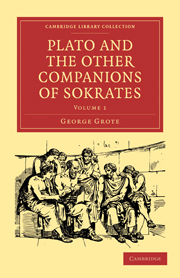Book contents
- Frontmatter
- PREFACE
- Contents
- CHAPTER I SPECULATIVE PHILOSOPHY IN GREECE, BEFORE AND IN THE TIME OF SOKRATES
- CHAPTER II GENERAL REMARKS ON THE EARLIER PHILOSOPHERS—GROWTH OF DIALECTIC—ZENO AND GORGIAS
- CHAPTER III LTFE OF PLATO
- CHAPTER IV PLATONIC CANON, AS RECOGNISED BY THRASYLLUS
- CHAPTER V PLATONIC CANON AS APPRECIATED AND MODIFIED BY MODERN CRITICS
- CHAPTER VI PLATONIC COMPOSITIONS GENERALLY
- CHAPTER VII APOLOGY OP SOKRATES
- CHAPTER VIII KRITON
- CHAPTER IX EUTHYPHRON
- CHAPTER X ALKIBIADES I. AND II.
- CHAPTER XI HIPPIAS MAJOR—HIPPIAS MINOR
- CHAPTER XII HIPPARCHUS—MINOS
- CHAPTER XIII THEAGES
- CHAPTER XIV ERASTÆ OR ANTERASTÆ—RIVALES
- CHAPTER XV ION
- CHAPTER XVI LACHES
- CHAPTER XVII CHARMIDES
- CHAPTER XVIII LYSIS
- CHAPTER XIX EUTHYDEMUS
CHAPTER XIV - ERASTÆ OR ANTERASTÆ—RIVALES
Published online by Cambridge University Press: 05 October 2010
- Frontmatter
- PREFACE
- Contents
- CHAPTER I SPECULATIVE PHILOSOPHY IN GREECE, BEFORE AND IN THE TIME OF SOKRATES
- CHAPTER II GENERAL REMARKS ON THE EARLIER PHILOSOPHERS—GROWTH OF DIALECTIC—ZENO AND GORGIAS
- CHAPTER III LTFE OF PLATO
- CHAPTER IV PLATONIC CANON, AS RECOGNISED BY THRASYLLUS
- CHAPTER V PLATONIC CANON AS APPRECIATED AND MODIFIED BY MODERN CRITICS
- CHAPTER VI PLATONIC COMPOSITIONS GENERALLY
- CHAPTER VII APOLOGY OP SOKRATES
- CHAPTER VIII KRITON
- CHAPTER IX EUTHYPHRON
- CHAPTER X ALKIBIADES I. AND II.
- CHAPTER XI HIPPIAS MAJOR—HIPPIAS MINOR
- CHAPTER XII HIPPARCHUS—MINOS
- CHAPTER XIII THEAGES
- CHAPTER XIV ERASTÆ OR ANTERASTÆ—RIVALES
- CHAPTER XV ION
- CHAPTER XVI LACHES
- CHAPTER XVII CHARMIDES
- CHAPTER XVIII LYSIS
- CHAPTER XIX EUTHYDEMUS
Summary
The main subject of this short dialogue is—What is philosophy? ἡ ϕιλοσοϕία—τὸ ϕιλοσοϕεῖν. How are we to explain or define it? Wliat is its province and purport?
Erastæ—subject and persons of the dialogue—dramatic introduction—interesting youths in the palæstra
Instead of the simple, naked, self-introducing, conversation, which we read in the Menon, Hipparchus, Minos, &c., Sokrates recounts a scene and colloquy, which occurred when he went into the house of Dionvsius the grammatist or school-master, frequented by many elegant and high-born youths as pupils. Two of these youths were engaged in animated debate upon some geometrical or astronomical problem, in the presence of various spectators; and especially of two young men, rivals for the affection of one of them. Of these rivals, the one is a person devoted to music, letters, discourse, philosophy:—the other hates and despises these pursuits, devoting himself to gymnastic exercise, and bent on acquiring the maximum of athletic force. It is much the same contrast as that between the brothers Amphion and Zethus in the Antiopê of Euripides—which is beautifully employed as an illustration by Plato in the Gorgias.
Two rival Erastæ—one of them literary, devoted to philosophy—the other gymnastic, hating philosophy
As soon as Sokrates begins his interrogatories, the two youths relinquish their geometrical talk, and turn to him as attentive listeners: their approach affects his emotions hardly less than those of the Erastes. He first enquires from the athletic Erastes, What is it that these two youths are so intently engaged upon? It must surely be something very fine, to judge by the eagerness which they display? How do you mean fine (replies the athlete)?
- Type
- Chapter
- Information
- Plato and the Other Companions of Sokrates , pp. 442 - 453Publisher: Cambridge University PressPrint publication year: 2010First published in: 1865



